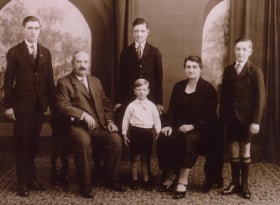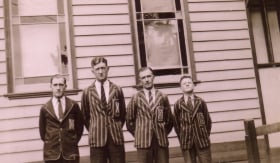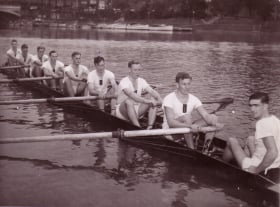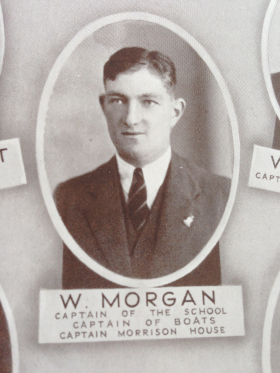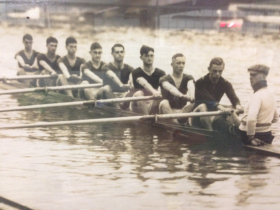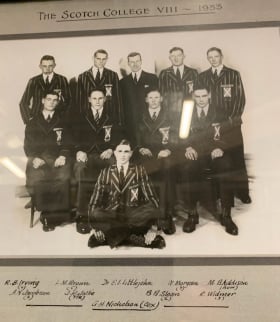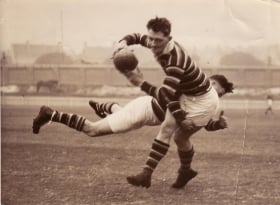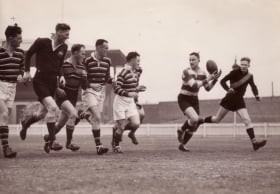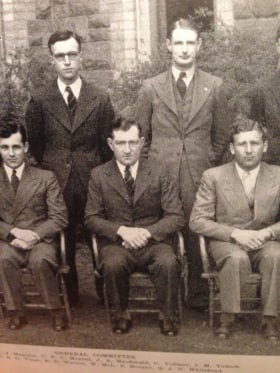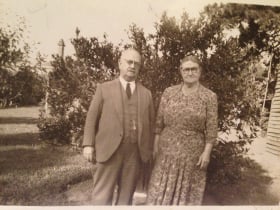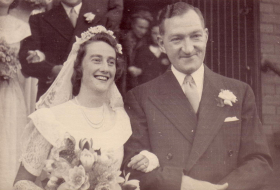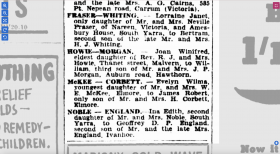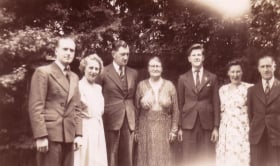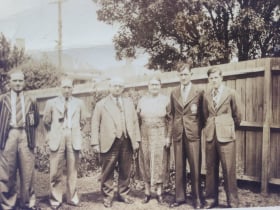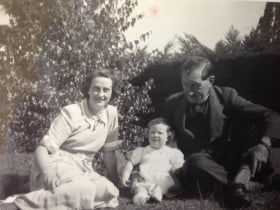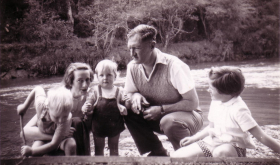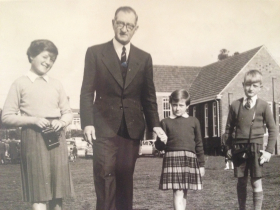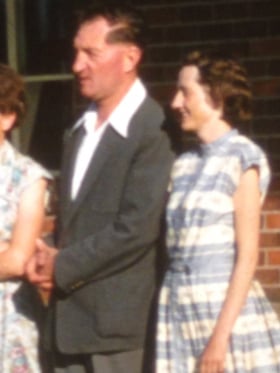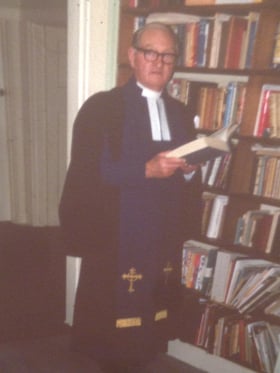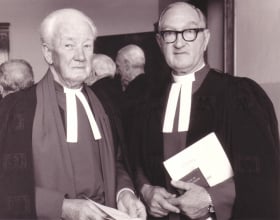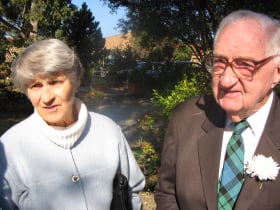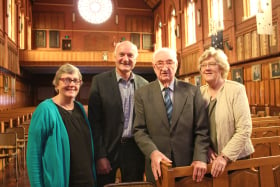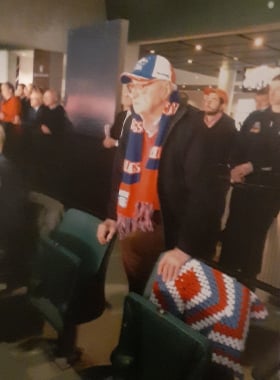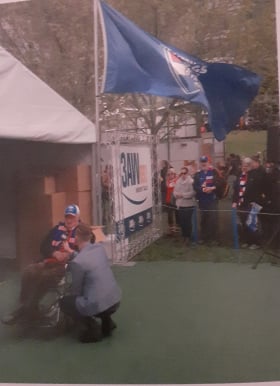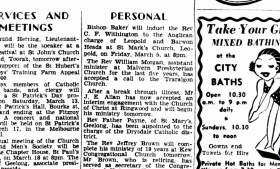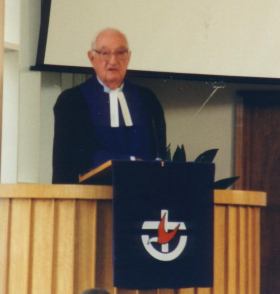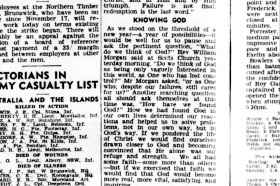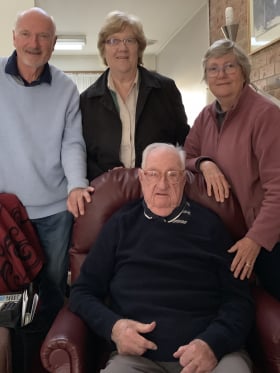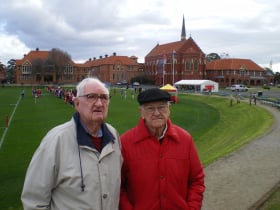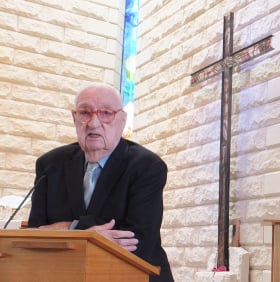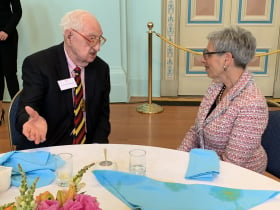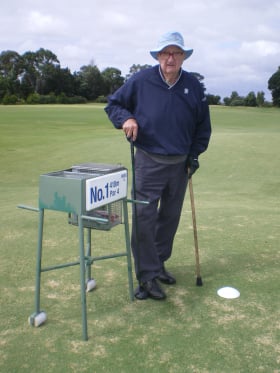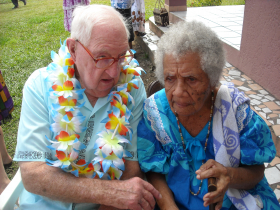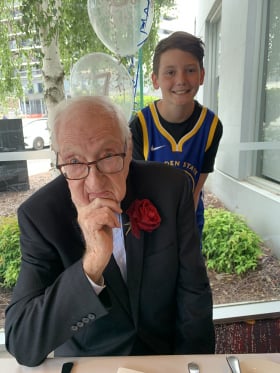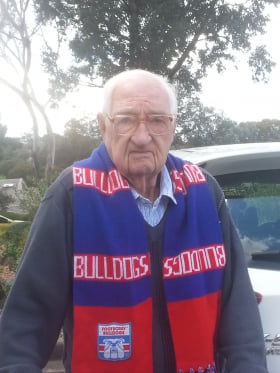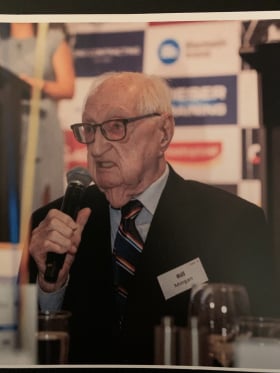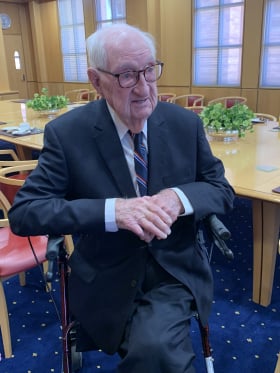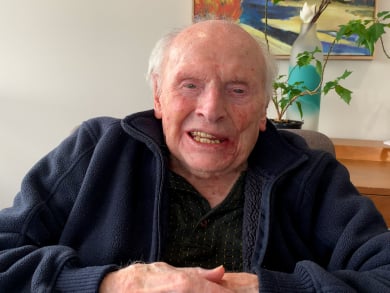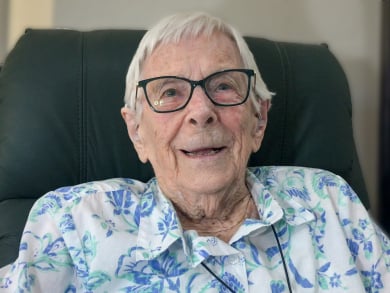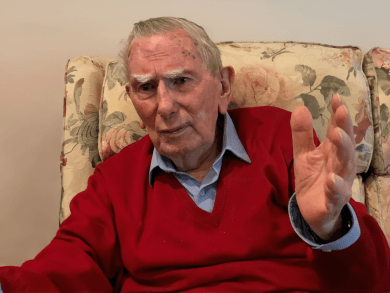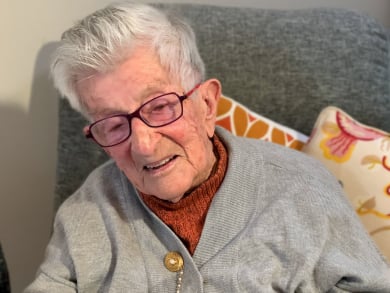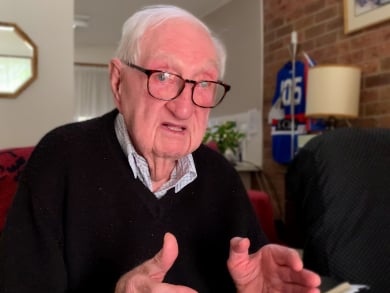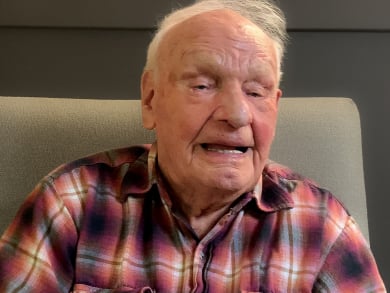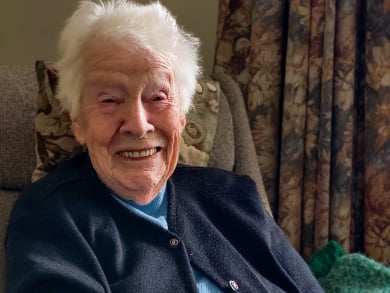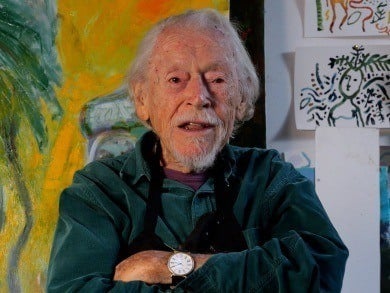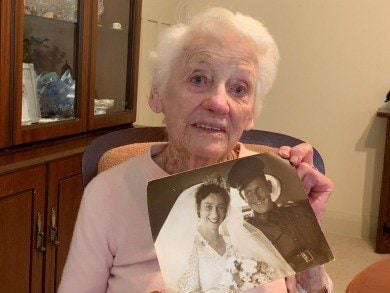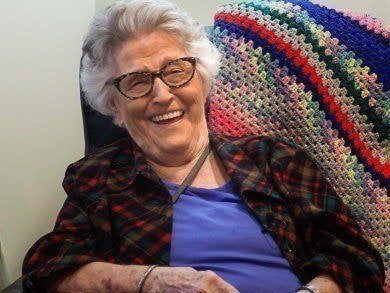If you tear down the forests,
you can expect trouble.
And yet we go on felling trees
and forests...
Destroying the forests.
We are caretakers of God’s world.
And how we look after
it is most important.
My name is William Morgan.
I was born in Seddon,
1915
So that makes me 107,
nearer to 108 than 107.
One of my earliest memories,
my grandfather
had a crutch to support him.
I said something or did something
and he chased me with the crutch.
My father
was a seagoing engineer.
He was chief engineer on the Blue
Funnel Line out of Edinburgh, I think.
Mum looked after the housework
I think.
Four brothers and one sister.
Very simple.
Very happy.
Pretty carefree,
Pretty carefree,
in a way, although
my parents, being Scottish,
they knew what discipline was,
and we knew
how far we could go
and you didn't go any further,
otherwise you were very quickly
brought to heel.
For us when World War One was over,
that was passed.
Yes, let's learn from the past.
The mistakes that were made.
Horrible mistakes that were made.
But we're living now.
Let's make something of it now.
Make the world a better place,
make people feel
more humane.
It wasn’t actually exactly spoken
about very much in the family.
But the way my father and mother lived,
they showed us how to deal with people,
how to treat people,
how to talk to people.
We moved from Seddon to Camberwell,
where I suppose I was two or three.
Something like that.
from memory, for about four years,
and then we moved back to Footscray
and lived at 10 Geelong Road
for about 12, 13,
14 years, something like that.
Footscray in those days was known
as a tough suburb.
It was hard.
We knew that
there were many people unemployed
in The Depression who were returned men
[from WWI]
You could hear the men going around
the street, “Any rags or bones or bottle?
Any rags or bottle?”
And also living in 10 Geelong Road,
Footscray, was right
up near the Footscray Park
and during The Depression,
many, many men
slept under the trees in the Footscray
Park.
Metho drinkers
and all sorts of people lived in
Footscray Park.
Footscray Park.
I know my mother was
frequently asked
for food by these people or something.
What they really wanted was money.
But she would never give them money.
She would make them sandwiches
or something
we had, anything left over from dinner.
Right. They could have dinner.
But very often, after they had gone,
and Mum went out, she would find
the sandwich that she had made for them
under the hedge in the front.
But it was a tough area
A tough area.
It was made tougher because of the
the unemployment.
that was about.
It was only as we came out
of the Depression that life in Footscray
began to change.
it was a fascinating time to be alive
in Footscray.
In a way we were,
not so much looked down upon, but we were,
like other people
who lived at that top end Geelong Road,
I could name them.
We had big houses.
It was assumed that we were wealthy
and we were regarded as snobs.
We didn't let that worry us.
We just got on and lived our life.
We became involved in church activity at
St Andrew’s Footscray
and there was no hassles there at all.
It was a very mixed
congregation of workers.
We had three of the Bulldogs football team
who were members
of the Presbyterian Church.
Tommy Waye,
Alf Samspon and Cheater
Stevens.
Saturday afternoon we followed Footscray.
I follow them.
I support them.
Had some amazing experiences
following the Bulldogs.
Well, one in particular,
we were playing North
Melbourne at North Melbourne
and my eldest brother
had been in England for two years.
He just had a slightest accent.
You knew he'd been there but...
And we were sitting in the grandstand
at North Melbourne, a rainy day
and surrounded
by North Melbourne supporters
and something happened during the game.
I can't tell you what it was,
but my brother said something
and one of the ladies
called out, “You Pommie bastard,
get out of here!
Get out of here!”
She attacked him with an umbrella
so we got out the grandstand
quick and lively.
Before the game there was invariably
a baseball game played up
the Drill Hall end of the ground,
with a press box behind the pictures thing
and the Hyde Street State School Band
played regularly,
the same piece week after week after week.
I saw the last one.
I was away at Shepparton
when they won before.
And I had a wedding that day.
Didn't last very long.
But my son took me
into the last one we won.
Great thrill.
Great thrill.
I went to school at Camberwell
State School
666, for about
four months.
And then, with my younger brother,
we were taken away from there
and I started
at Scotch College in 1924
where I spent the rest of my school days.
It was a very happy place.
The discipline was quite,
quite strict without being restrictive.
Our teachers were our friends.
We never dared
call them by their Christian name.
They were ‘Miss’ and ‘Mr’..
If we had a party, they were invited.
Not always came but they were invited.
One of my
favorite memories is
the 1934 floods.
I happened to be captain
of the boats that year
and we were told
the River Yarra was going to flood.
And about four of us spent hours
tying down the boats in the shed
so they wouldn't float around.
But it was an old wooden boat shed
and during the night
the floods were so strong
coming down the Yarra
that the whole boat shed was
just washed away.
We don’t where the boats finished.
They just disappeared down the river
somewhere.
I went up to the university.
I was supposed to study
for a Bachelor of Arts.
I was going into the Ministry.
Those days you did Arts and then you went
on, did your theological training.
But I made a mess of that.
They often say I graduated
from Melbourne University
with first class honors in sport.
I played rugby there.
Front row,
blind side, front row.
But I finished up with being captain of
the Melbourne Rugby team and was chosen
in the all Australian University team,
and had two years,
1936, 37 in the Victorian State team.
Rugby.
In my first interstate game
we had people like Weary Dunlop playing.
And of course those days
Victoria was a chopping block
for NSW and rugby.
And I can see Weary Dunlop
now in the Sydney Cricket Ground.
He got the ball and started to run.
He must’ve run about 50 yards.
And the people tried to tackle him,
but he just brushed them aside
and went straight through
and he scored a try.
One of the only tries that Victoria
ever scored, I think in those days against
New South Wales.
Weary was a very,
very quiet man, but a very strong man
and when he wanted to speak, he spoke
and you listened.
Of course, his actions spoke ever
so much louder than his words.
Al the way back then, he didn't say much,
he did things.
It was great to know him.
As children,
we went to Sunday school at St Andrew’s
Footscray.
And church
and Sunday school were part of our life.
Our whole family were involved.
And then in 1933,
there was a young English
Commodore out here
and he was talking to young people
about the claims
of Jesus Christ on your life.
He's not just somebody you talk about,
He died for you.
And in about 1933,
Jesus, who he was reserved for Sunday
suddenly became very important
and I wanted to share the story,
something of my experience
with other people .
And I did.
As I said, that’s when my mates said,
“Give you six months, Bill.
It won’t last”.
And unfortunately,
they're all dead now.
And here I am
still trying to
talk to others
about faith and Christ - not at some
theological doctrine,
but as a living person, a living friend.
Say someone who's given me something
to live for.
After university experiences, I went into
what was called the Theological Hall,
the Presbyterian Church
where, after three years, well
you were thrown to the wolves.
My first placement
was in Clare, South Australia.
It war time
and there was virtually nobody there.
I came back to be assistant
at the Wattletree Road
Malvern Presbyterian Church,
married the boss’ eldest daughter,
and we went to Trafalgar in Gippsland.
Where I stayed for five years.
Scotch Church, Shepparton,
and the first full time
chaplain of Scotch
College in Launceston, Tasmania,
and then back to the suburb of Ormond,
Melbourne,
spent the last 22 years of my ministry
and I retired from Ormond.
1984
With society the way it has developed,
the church has tried to keep pace with it
and mix in with it
and still be a bit different, but
it hasn't been able to do it.
My own opinion is that the Uniting Church
is in trouble.
It’s in trouble.
It's not making any progress.
It’s going backwards.
It’s got such a big social service
program, we can't operate as a church.
We've got to do what the government says.
Now I don’t believe
the church should ever be in a position
where it kowtows to government
or to any other body.
The church has got a certain mission
to carry out.
Now, I know times have changed.
In my time, it was a 24 hours
seven job.
And you lived along side your church.
If people were in trouble,
they knew the minister lived there.
If a stranger was in trouble, you’d
say, “Oh well,
you'll find help in the Church”.
“Oh, where does the minister live?”
“He’s got his own home somewhere else.”
Some of them are now saying [they’re]
not available after 5:30.
But unfortunately people’s
physical condition doesn't end
at 5:29.
They might want a minister urgently.
Seven o’clock, not available.
My first wife was a kindergarten teacher,
an accomplished pianist,
a fair tennis player.
Not a...
What can I say?
Not one of these bubbly people
that was into everything.
She was quiet
and just went on doing her thing.
A wonderful mother
to our three children.
Her name was Joan Winifred Howie.
She, with our third child,
she became pregnant.
After a while,
we knew something was wrong.
The doctors in Shepparton
didn’t pick it up.
When it was almost too late, an old doctor
in Malvern picked it up.
She was able to bear that child
but never really recovered from it.
And when our youngest child was three,
she died.
It was an
experience one never forgets
to know that your wife was sick
and the doctor doesn't
do anything about it
until it was almost too late
Yeah...
I relive it time and time again.
I re-married, but it’s not the same.
I've been blessed with three children
who, perhaps,
we have grown closer together
three children because I had to be father
and mother to them
for years and years
and then, even with my second wife,
I was still the one.
And today it’s just wonderful.
But grandchildren
remind you there's something else
coming up. There’s another generation coming.
You’ve
got to think again about what life is
and how you are going to relate them
to the life which you know is good and
right.
My second wife was a girl...
someone I met in South Australia
when I was there.
I hadn’t seen her for many, many years.
One day
I was in the Presbyterian book room
and this lady came up and said,
“Are you Bill Morgan?”.
I said, “Yes”.
She told me who she was
and I courted her
for about six months or so.
Got the three children used to the fact
they might have another person
in the house
that they might call ‘mother’ or just...
Eventually we married,
about 40 years together.
She's been dead now ten years.
So I’ve seen both sides of married life.
All the joys and thrills of it
and all the sadness
of losing partners.
Yes.
I think you only discover the strengths
and the weaknesses of someone
you might want to be a partner
in time.
There is a time for courting,
there’s a time for exploring each other's
weaknesses and strengths,
each other's hopes and desires and fears.
Something that grows close.
Yes, I know there are marriages that..!
And when they work, they work wonderfully.
But I think they’re the exception.
It’s hard to have a favorite hymn
because hymns reflect certain
periods, certain experiences of your life.
Like I've got my funeral service arranged.
I’ve got the three hymns
that I want sung at my funeral.
Well, the first one is
to more or less to start the service.
The first hymn in the service,
it’s not the start.
“Tell out my soul
the greatness of the Lord”.
We’re grateful for this life.
Let's tell it out.
That’s a proclamation.
The second one is “Be still my soul
the hour is hastening on”.
Words of comfort
following what's been said and so forth
and the last one is a general one,
“Love divine all loves excelling”.
And the last one is
His words of comfort to go out and live
I’ve changed the first and second hymn,
I think at least twice
if not three times,
but I’ve settled on those now.
